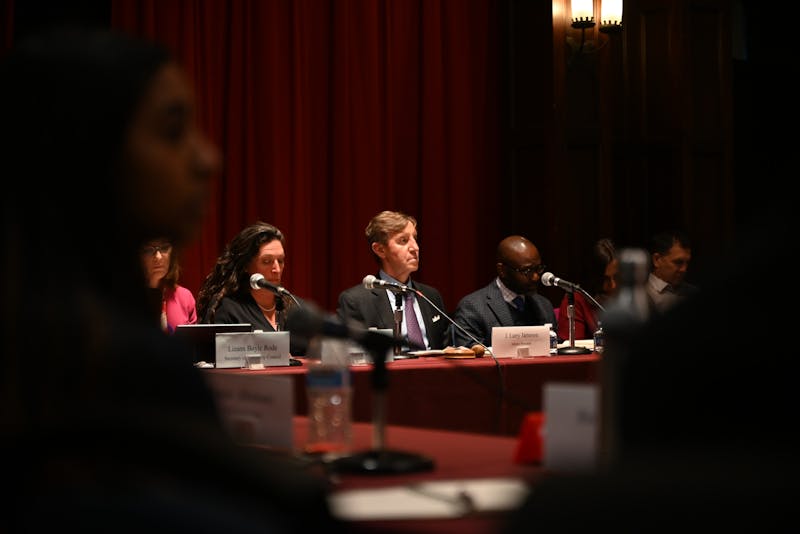A group of 50 ex-inmates at a Philadelphia jail are accusing University researchers of causing them long-term suffering. From 1951 to 1974, a team of University researchers conducted experiments on thousands of inmates at Northeast Philadelphia's Holmesburg Prison, testing products like toothpaste, shampoo, skin creams, liquid diets and foot powders. At the time, the tests were legal and consensual and didn't seem like the kind of thing that would have any long-term repercussions. Now, however, a group of former prisoners who were subjects of the tests say that something went terribly wrong -- and they want to hold Penn accountable. The ex-inmates, mostly men, charge that it was unethical of Penn to test the products on humans, and say the experiments have caused lingering health problems. Penn officials, however, say the subjects legally consented to the tests and argue that the experiments cannot be proven to have caused the ailments. In a protest in front of the Hospital of the University of Pennsylvania two weeks ago, about 50 ex-prisoners demanded recognition, treatment and compensation for the pain and suffering they experienced as a result of the tests they consented to while incarcerated at Holmesburg. The protesters were part of a support group that was established soon after a book describing the experiments was published in June by a former literary instructor at Holmesburg, which closed in 1995. The former prisoners want follow-up treatment at medical centers besides Penn, compensation for their pain and suffering and money for rehabilitation. "We're going after them because they manipulated us, they exploited us, they deceived us," said Leodus Jones, 55, a former prisoner and current director of Community Assistance for Prisoners, a separate advocacy group for current and former inmates in Pennsylvania. Penn officials have offered the former prisoners free medical evaluations at HUP, even though they said they are not convinced that the ex-prisoners' ailments resulted fully from the prison tests. The prisoners say the offer doesn't go far enough. Edward Anthony, 55, a resident of Philadelphia's Germantown section, said he suffers stomach problems and fingernail deformities as a result of two studies done on him while in prison. He currently receives disability pay for the problems. "They owe me something," said Anthony, who was at Holmesburg from 1964 to 1966 for drug possession. "I have changed my life for the [better], and I can't even enjoy it because I'm too sick." Past and Present The book that brought the ex-prisoners' story to the forefront, written by Temple University Urban Studies Professor Allen Hornblum, is called Acres of Skin. The title is taken from a quote from Albert Kligman, the Penn researcher who led the Holmesburg tests, upon first entering the prison in 1951. "All I saw before me were acres of skin. It was like a farmer seeing a fertile field for the first time," Kligman told The Philadelphia Bulletin in 1966. Kligman, a Penn Dermatology professor emeritus who is credited with the discovery of the popular anti-wrinkle and -acne cream Retin-A, is now semi-retired, although he sees patients once a week at HUP. And while the prisoners volunteered for his studies, were paid for their participation and signed legal consent forms before they became test subjects, they now say the forms were vague and that they were not given complete information about what was being done. "[Kligman] is saying he gave informed consent," Jones said, "and he's lying. He didn't inform us of anything except that we're being put in a test study." The University has offered free medical evaluations -- at Penn's facilities -- to ex-prisoners who think their medical problems resulted from the tests. But Medical School Senior Vice Dean Richard Tannen said it will be difficult to determine that there is "reasonable likelihood" that current ailments are from tests done at Holmesburg. Free treatment is not guaranteed, he added. He said that at the time the experiments were done it was "pretty widespread practice" to use prisoners for medical experimentation, though, in the early 1970s, laws were passed to prevent medical researchers from taking advantage of "vulnerable populations" like prisoners, retarded children and senile adults. But since the former prisoners have not yet directly contacted the University, a concrete solution does not seem imminent. Tannen said he has only heard from them through the media and only one person has called for a free evaluation so far. The former inmates said that it is the University's responsibility to contact them, but are planning to set up negotiations themselves "to see how sincere they're being," Jones said. They have hired a lawyer, Gloria Gilman, to handle their case, and she said yesterday that she will contact the University in the next few days. Gilman said her team of five lawyers -- including representatives from the American Civil Liberties Union and the Pennsylvania Institutional Law Project -- is still working on interviewing the ex-prisoners and figuring out what their claims are, although she is certain their rights were violated. She said they are sending a letter to Thomas Tammany, the Penn Health System's chief counsel, in an attempt to set up a dialogue regarding "appropriate and ascertainable" solutions. If "adequate compensation" cannot be agreed upon, the case might have to go to litigation, she said. One problem with a lawsuit, though, is the former inmates were wronged some 25 to 50 years ago, while Pennsylvania's statute of limitations is two years. Gilman said she has legal strategies and "ways to overcome the problem," but it is still too early in the process to speculate. University officials were unavailable for comment yesterday on the possibility of litigation. Ongoing Controversy Since writing the book, Hornblum, who continues to teach at Temple, has been advising the former inmates and speaking about his book. He claims that his book is by far the most thorough account of the incident, covering its origin and development and the transition from an academic enterprise to a commercially-driven one. In the book, which he started writing in 1993, Hornblum compares the ex-prisoners to victims of Nazi concentration camps. Tannen said he and "anybody who's rational" finds this comparison -- and other parts of the book -- "offensive." And while newspapers covered the experimentation while it was occurring, the stories lacked follow-ups and just "aided and abetted the University and Kligman to continue doing what they were doing," Hornblum said. Some of the articles labeled the prisoners "heroes" for helping further medical research. The 82-year-old Kligman has played a controversial role in medicine over the years. In 1966, he was the first researcher in the history of the U.S. Food and Drug Administration to be banned from testing drugs on humans, though he was later given permission to resume testing. He was also involved in litigation with the University and Johnson & Johnson over the patent for Retin-A in the early 1990s. Kligman would not comment on the most recent events, and his office referred all questions to Health System officials. Two local government officials are also trying to help the ex-prisoners' plight. State Rep. Harold James (D-Philadelphia) said he was pursuing hearings in Harrisburg, P.a. to formulate policies that will prevent testing without regard for its long-term effects from happening again. "It's atrocious that these kinds of studies were done," he said, adding that the exposure that they are now getting will help ensure that it will never be done again without long-term care and compensation. And City Councilman David Cohen told The Philadelphia Inquirer that he would introduce a resolution calling on the University to provide reparations. But until a more concrete solution is reached, the ex-prisoners can take advantage of their free medical evaluations. Jones said, though, that they are not comfortable with getting medical evaluations at Penn, since Kligman's students are still at the University. According to Jones, the ex-prisoners are concerned that the doctors would combine data from the evaluations with the older data sets to look at the long-term results of the exposure. "Why would they go back to them," Jones said, "at least without assurance that no further experiments will be done?"
The Daily Pennsylvanian is an independent, student-run newspaper. Please consider making a donation to support the coverage that shapes the University. Your generosity ensures a future of strong journalism at Penn.
DonatePlease note All comments are eligible for publication in The Daily Pennsylvanian.







